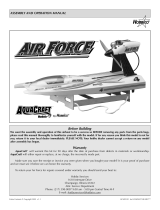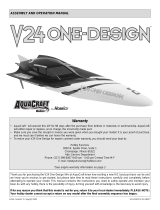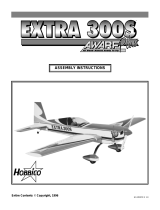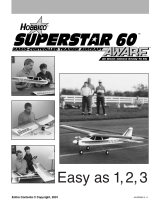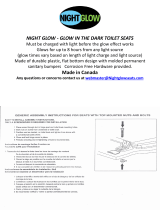Page is loading ...

Warranty
• AquaCraft
™
will warrant this kit for 90 days after the purchase from defects in materials or workmanship. AquaCraft will
either repair or replace, at no charge, the incorrectly made part.
• Make sure you save the receipt or invoice you were given when you bought your model! It is your proof of purchase
and we must see it before we can honor the warranty.
• To return your Nitro Hammer
™
for repairs covered under warranty you should send your boat to:
Hobby Services
1610 Interstate Drive
Champaign, Illinois 61822
Attn: Service Department
Phone: (217) 398-0007 9:00 am - 5:00 pm Central Time M-F
E-mail: hobbyser[email protected]
HCAZ3012 for HCAB26**Entire Contents © Copyright 2002
ASSEMBLY AND OPERATION MANUAL
™
™
Before Building:
We want the assembly and operation of this boat to be a success so BEFORE removing any parts from the parts bags please
read this manual thoroughly and watch the included video to familiarize yourself with the model. If for any reason you
think this model is not for you, return it to your local dealer immediately. PLEASE NOTE: Your hobby dealer cannot accept
a return on any model after assembly has begun.

INTRODUCTION ..............................................................2
SAFETY PRECAUTIONS......................................................2
HELPFUL HINTS ................................................................2
REPAIR SERVICE ................................................................2
SPECIFICATION & DESCRIPTION CHANGES ..................2
SCREW INFORMATION ....................................................3
BOAT TERMINOLOGY ......................................................3
FIELD EQUIPMENT............................................................3
TOOLS YOU WILL NEED ..................................................3
FINISHING THE NITRO HAMMER ....................................3
FINAL ASSEMBLY ..............................................................3
RUNNING THE ENGINE....................................................4
BREAKING IN THE ENGINE ..............................................5
ENGINE MAINTENANCE ..................................................5
PERFORMANCE TRICKS AND TWEAKS ............................7
RACING ............................................................................7
ORDERING REPLACEMENT PARTS ................BACK COVER
TROUBLESHOOTING FLOWCHART ............BACK COVER
Thank you for purchasing the AquaCraft Nitro Hammer! This
manual contains the instructions you need to safely build,
operate and maintain your nitro R/C boat. Read over this
manual thoroughly before operating the Nitro Hammer.
• Use care to avoid touching the propeller anytime the
engine is running. Pay equally close attention to items
such as loose clothing, shirtsleeves, ties, scarves, long hair
or anything that may become entangled in the spinning
prop. If your fingers, hands, etc. come in contact with the
spinning propeller, you may be severely injured.
• Because of the speed and mass of this boat, it is capable
of inflicting property damage and severe personal injury
if a collision occurs. Never run this boat in the presence
of swimmers or where the possibility of collision with
people or property exists.
• This boat is controlled by radio signals, which are subject
to possible interference from other R/C transmitters,
paging systems or other electrical noise. Before turning
your radio on, make sure no one else in the area is
operating a radio on the same frequency (channel).
• Model engine fuel is poisonous. Do not allow it to come
into contact with the eyes or mouth. Always store fuel in a
clearly marked container and out of the reach of children.
• Model engine fuel is highly flammable. Keep it away
from open flame, excessive heat, sources of sparks, or
anything else that might ignite it. Do not smoke or allow
anyone else to smoke in close proximity to open fuel.
Make sure that fuel lines are in good condition so that
fuel will not leak onto a hot engine causing a fire.
• Never operate your engine in an enclosed space. Model
engines, like automobile engines, exhaust deadly carbon
monoxide. Run your engine only in an open area.
• Model engines generate considerable heat. Do not touch any
part of your engine until it has cooled. Touching the muffler,
cylinder head, or exhaust header may result in a serious burn.
• Use safety glasses when starting or running engines. The
propeller may throw loose material such as sand or
gravel into your face.
Avoid running the boat in cold weather. The hull and
plastic parts can become brittle at low temperatures. In
addition, grease and oil become thick, causing premature
wear and poor performance.
If the buyer is not prepared to accept the liability associated
with the use of this product, the buyer is advised to return
this kit immediately in new and unused condition to the
place of purchase.
• Avoid working over a deep pile carpet. If you drop a
small part or screw, it will be difficult to find.
• Place a mat or towel over your work surface. This will prevent
parts from rolling off and will protect the work surface.
• Test fit all parts before attaching them permanently.
Repair service is available anytime.
After the 90-day warranty, you can still have your Nitro
Hammer repaired for a small charge by the experts at
AquaCraft's authorized repair facility, Hobby Services, at the
address listed on the front page of this manual. To speed up
the repair process, please follow the instructions below.
1. Under all circumstances return the ENTIRE system,
boat and radio.
2. Make sure the transmitter is turned off, all batteries are
removed and fuel is drained from the tank.
3. Send written instructions which include: a list of all
items returned, a THOROUGH explanation of the
problem, the service needed and your phone number
during the day. If you expect the repair to be covered
under warranty, be sure to include a proof-of-purchase
date (your store receipt or purchase invoice).
4. Also be sure to send your full return address.
All pictures, descriptions and specifications found in this
instruction manual are subject to change without notice.
AquaCraft maintains no responsibility for inadvertent errors in
this manual.
SPECIFICATION & DESCRIPTION CHANGES
REPAIR SERVICE
HELPFUL HINTS
SAFETY PRECAUTIONS
INTRODUCTION
TABLE OF CONTENTS
2

Do not use too much force when tightening self-tapping
screws into plastic or fiberglass. Over tightening will cause
the threads in the plastic to strip. We recommend that you
stop turning a self-tapping screw once you feel some
resistance as the head of the screw comes in contact with the
plastic. Avoid using powered screwdrivers when assembling
this kit. They tend to over tighten the screws. Do not use
thread-locking compound on self-tapping screws. The thread-
locking compound may damage the plastic. IMPORTANT:
Use thread lock on any fastener that is threaded into metal or
fastened with a nut. Vibration from the engine will cause the
screws to loosen if thread-locking compound is not used.
• BOW: The front of the boat
• STERN: The back of the boat
• PORT: This is the left side of the boat when aboard and
facing the front (bow).
• STARBOARD: This is the right side of the boat when
aboard and facing the front (bow).
• HULL: The body of the boat.
• DECK: The top of the boat.
❏ HCAP2520 Hot Shot
™
2 Glow starter
❏ 10-20% Nitromethane Model Car Fuel
(10%–DTXP0570, 20%–DTXP0600)
❏ DTXP0125 Kwik-Pit
™
250 Fuel Bottle
Other Useful Items to Have On Hand:
❏ OSMG2691 Glow Plugs
❏ GPMQ4131 Fuel Tubing
❏ HCAP3000 After Run
™
Engine Oil
❏ Phillips head screwdriver (HCAR1022)
❏ 4-way wrench (DTXR1170)
❏ Needle-nose pliers (HCAR0625)
❏ Adjustable wrench or 5.5mm wrench (for changing
propellers)
Decals have been provided for your Nitro Hammer. Simply
cut them out, peel and stick! See the photos on the box for
decal placement.
Carefully remove your Nitro Hammer from the box and place
it atop the pre-built boat stand. Remove all remaining
components from the box. You may wish to keep the box in
order to more easily transport and store your Nitro Hammer.
Transmitter Assembly
❏ 1. Remove the transmitter
antenna from the parts bag
and screw it into the top of
the transmitter. To ensure
that the antenna is attached,
lightly pull on the base of
the antenna. If it slides out, it
is not installed properly.
❏ 2. Slide off the battery
door on the bottom of the
transmitter. Install 8 new “AA”
batteries into the bottom of
the transmitter in the
configuration molded into the
battery holder. Re-install the
battery door onto the bottom
of the transmitter.
❏ 3. Turn the transmitter on using the switch on the front. The
red LED light next to the on/off switch should light up. If the
LED does not light up, turn the transmitter off and check to
make sure that the batteries are installed properly. If you see a
flashing LED, the batteries are low and need to be replaced.
Receiver Preparation
❏ 1. Remove the body clip at the rear of the top deck and
carefully remove the hatch.
FINAL ASSEMBLY
FINISHING THE RTR NITRO HAMMER
TOOLS YOU WILL NEED
REQUIRED FIELD EQUIPMENT
BOAT TERMINOLOGY
SCREW INFORMATION
3
ON / OFF
THROTTLE SERVO
REVERSE
STEERING
SERVO
REVERSE
POWER
LIGHT
STEERING
TRIM
ADJUSTABLE
STEERING
RATE
THROTTLE
TRIM
Install (8) new "AA" batteries

❏ 2. Remove the body clip that holds the lid to the radio box
and carefully remove the cover.
❏ 3. Carefully uncoil the receiver antenna and route it
through the small hole on the side of the radio box and up
through the antenna hole.
❏ 4. Slide the antenna wire through the antenna tube and
place the antenna tube into the rubber grommet. DO NOT
CUT OFF THE EXCESS ANTENNA WIRE!
Installation of Batteries
❏ 1. Place four (4) new “AA” batteries into the receiver
battery holder. Be sure to follow the configuration molded
into the battery holder.
❏ 2. Put the radio box cover back on and replace the body clip.
Check the Radio System:
❏ 1. Standing behind the boat with both the vessel and
transmitter powered up, rotate the wheel to the left. The back
of the rudder should move towards the left. Move the wheel
to the right. The back of the rudder should move towards the
right. If this is not the case, simply move the steering servo
reverse switch to the other position.
❏ 2. Squeeze the trigger on the transmitter; this should open
the throat of the carburetor. Conversely, moving the trigger
forward will close the throat completely.
❏ 3. The adjustable steering rate knob (labeled D/R) located atop
the transmitter (see page 3) is the steering rate adjustment.
Turning the knob to the right increases the amount of travel of the
rudder while turning it to the left decreases the rudder amount of
travel. Beginners may want less amount of travel to start with.
Before running the engine, read the manual and watch the
video that came with this kit.
There are Several Simple Steps to Starting the Engine:
❏ 1. Install a glow plug if one is not in your engine. The glow
plug threads into the top of the cylinder head.
❏ 2. Fill the tank almost to the top. Leave a little air at the top
of the tank.
RUNNING THE ENGINE
4

❏ 3. Open the high-speed needle valve 2-1/2 turns out
(counterclockwise) from fully closed. The high-speed needle is
sticking up on the left side of the carburetor (looking at it from
behind the boat). If you have previously run the boat, keep the
same needle valve setting that you used on your last run.
❏ 4. Prime the engine by pushing the primer button on the fuel
tank 2-3 times or until you see fuel entering the carburetor. The
quantity of fuel drawn into the engine by priming is an
important factor in starting the engine successfully.
IMPORTANT: The propeller will begin spinning as soon as the
engine starts! Be certain that the propeller is unobstructed;
failure to do so will damage the prop.
❏ 5. Secure the glow starter onto the engine's glow plug.
❏ 6. Check that the throttle is 1/8 open from the fully closed
position. Pull the handle of the recoil starter in quick, short
pulls. Repeat, if necessary until the engine fires. DO NOT
PULL THE RECOIL HANDLE OUT ANY MORE THAN 15
INCHES; DOING SO MAY DAMAGE THE PULLSTART.
❏ 7. With the engine started, remove the glow starter after
10-15 seconds.
❏ 8. Put the hatch cover back in place and replace the body
clip. BE CAREFUL NOT TO TOUCH THE SPINNING PROP!
If the engine fails to start, refer to the TROUBLE SHOOTING
CHART on the back cover.
Fuels
Use nitro fuels that are specially formulated for model engines.
Typically this would be 10-20% Nitro-methane car fuel.
In order to perform adjustments as needed, the break-in
procedure should be performed on dry land with your Nitro
Hammer securely held in place.
To insure long life and good performance from your AquaCraft
Pro .15 engine, you MUST break-in the engine. The break-in
period is critical for long life of the internal parts of the engine.
This should be done over the first 5 or 6 tanks of fuel. Be sure
to watch the engine tuning video that came with this kit.
Some Things to Remember During Break-In
1. Use the same fuel that you will use for normal running.
2. Resist the urge to accelerate and decelerate the boat quickly.
3. Break-in puts stress on the glow plug and you can burn it
out during break-in. Make sure you have an extra plug or two
on hand.
How To Stop Your Engine
Just as squeezing the throttle trigger on your transmitter
increases power, pushing the trigger the opposite way
decreases power. Pushing the throttle trigger forward will
close off the throat of the carburetor completely, cutting off air
intake and stopping the engine.
The First Tank
Your first tank of fuel should be running the boat at a very rich
high-speed needle valve setting. This allows the fuel to carry
as much oil as possible into the engine to lubricate the
internal parts during the break-in.
1. Open the needle valve 2-1/2 turns out from fully closed
(counterclockwise). This is factory set already, but check it to
make sure. When closing the high-speed needle, close the
needle until you feel some resistance. DO NOT overtighten
or you will damage the carburetor.
2. Start the engine.
3. Once the engine is started, open the high-speed needle
valve around 1/8 turn at a time, finding the setting where the
engine just barely runs. This may take a few times adjusting
the needle. The engine will perform sluggishly and stall from
time to time - this is normal during the break-in process.
4. Place the boat in water and run the engine at a medium
speed, periodically accelerating and decelerating.
5. Continue running the engine until the tank is almost out of
fuel. Do not allow the engine to run out of fuel. This leans out
the engine and can cause overheating.
Tanks 2-6
Turn in the needle valve (clockwise) around 1/8 turn from the
previous setting. You should notice that the engine performs
better during each run. After the 6th tank, you should be near
to the peak performance of the engine.
Ways To Ensure A Long Life For Your Engine.
1. Keep your engine clean. Dirt will act as insulation on an
engine. It will not be able to shed heat as easily.
ENGINE MAINTENANCE
BREAKING IN THE ENGINE
Carburetor Partially Open
5

2. Do not over-lean your engine.
3. Do not run your engine without a propeller.
4. Do not over heat the engine. This goes along with keeping
it clean and not over-leaning the engine.
5. Make sure that you use a fuel from a reputable
manufacturer that is labeled as model engine fuel.
6. Avoid using old fuels in the engine. Always run all of the fuel
out of the engine. After running for the day, use after-run oil and
work it into the engine by pulling the pull-starter 2-3 times.
7. Do not use a fuel with a Nitromethane (often called nitro)
content over 30%.
8. Do not use silicone sealer on the engine joints. Silicone
sealer contains acetic acid, which is corrosive if it gets inside
your engine.
9. Store your engine someplace where it will not be subjected
to extreme temperature changes.
If you are having problems with your engine consult the
engine-troubleshooting flowchart on the back cover of this
manual. The following are some potential problems.
Glow Plug
The glow plug is an item that will wear out and need replacement
from time to time. It is a good idea to remove the glow plug before
your first run, heat it and see how well it glows. You should see a
bright orange glow from the filament. If a coil or two will not glow
or the plug will not glow at all, replace the plug. If the engine quits
when you remove the glow starter, the plug might need to be
changed, although this may be because you are running too rich
and need to screw in your high-speed needle some. Look at the
glow plug when you are running the engine. If you see some
bubbles coming from around the plug, replace the glow plug
(copper) gasket, or both the plug and the gasket. The only real way
to test a glow plug is to replace it. Make sure you have a spare
plug or two on hand every time that you run the Nitro Hammer.
Fuel
Fuel can go bad. The main ingredient in model fuel is methanol,
which is basically a form of alcohol. Alcohols can absorb water
out of the air, so keep your fuel jug capped at all times. Store
your fuel out of the sunlight and in a cool place. Bad fuel is one
of the most difficult problems to diagnose in engines. If you have
tried everything you can think of to remedy an engine that is not
running correctly, try using some fresh fuel.
Fuel line is susceptible to pinhole leaks. You cannot see the
hole in the fuel line, but if you see bubbles in the line going
to the carburetor, replace the fuel line. Another symptom of a
leak in the fuel line is a surging engine. The properly tuned
engine will surge when the air bubbles enter the carburetor.
It is basically leaning out the mixture.
Overheating
One of the worst things you can do to your engine is overheat
it. The oils that lubricate the engine are carried in the fuel. If
your engine is set too lean, there will not be enough oil in the
engine to lubricate the internal parts. This will cause premature
wear in the engine and cause damage.
Running the Nitro Hammer:
• Before running your Nitro Hammer, it is a good idea to
check the water-cooling system to make sure all tubes are
properly connected.
• Check over all screws to make sure they are securely fastened.
• Place the boat in water that is at least 8" deep and free of
obstacles (weeds, sticks, ducks, muskrats, etc.).
• Periodically remove the drive shaft and relube with a thin
coat of petroleum jelly or light grease.
• CAUTION: It is common practice to slow down a little for
sharp turns. If you don't, there will be an increased chance of
flipping over.
• Slowly advance the throttle to full speed and note if the
boat has a tendency to turn right or left. Adjust the steering
trim knob on your transmitter until the boat runs in a straight
line when the steering wheel is at neutral.
• CAUTION: Windy conditions cause rough water that will
affect the performance of your Nitro Hammer and increase
the chances of capsizing.
• Total run time of the Nitro Hammer is approximately 6
minutes (assuming you begin with a full tank of fuel). When
you notice an increase in power, it means the fuel tank is
nearly empty and it's time to head for shore. As soon as the
boat reaches shore, stop the engine by pushing forward on
the throttle trigger; turn off the receiver and finally the
transmitter (in that order).
• CAUTION: The engine will be hot! Allow it to cool for a
few minutes before restarting.
• Your Nitro Hammer will often take on small amounts of
water, especially when running in rough water and when
making tight turns. Keep a roll of paper towels handy and dry
out the hull interior after every run. If you notice excessive
amounts of water in the hull, check for leaks, especially
around the hull/deck joint. You may reseal the joint using
medium cyanoacrylate (CA) glue.
• Always store your Nitro Hammer with the canopy/hatch
cover removed to allow the interior to dry out completely. If
you neglect to do this, it may result in corrosion of the
electronic components.
• IMPORTANT: If, for whatever reason, your boat takes on a
large amount of water, swamps or sinks, causing the radio
6

equipment to get wet, you must do the following
immediately: Remove the battery pack and radio equipment
from the boat. Allow the components to air dry completely
before reassembling. Reinstall the components and check for
proper operation before running the boat in water.
If you are thinking about modifying your Nitro Hammer, keep
this in mind: A tremendous amount of research and
development has gone into the Nitro Hammer with speed,
stability, maneuverability and run time as our primary
considerations. Therefore, many of the modifications that you
may try in order to increase speed will probably result in
decreased performance in other areas. We think our
combination of engine and propeller is close to optimum for
a boat of this type, so we suggest that you accept those items
without change.
Listed below are some ideas to help you “trim out” your boat
to get the best performance:
• Cut a 1" diameter hole above the carburetor. This will
improve airflow to the carb and increase top end speed.
• Wax the hull with a good quality, non-abrasive automotive
wax, such as “carnauba wax”. This will reduce the surface
tension (resistance) between the hull and the water, allowing
the boat to move faster.
• Adjust the trim plates up or down to maximize speed. There
is a fine line between fast speeds and optimum handling. If
the boat tends to “porpoise” (meaning that the nose of the
boat bobs up and down on straights), bend the trim plates
down slightly. Repeat this process until it stops.
• Sharpen the leading edge of the rudder. This will
reduce resistance.
Although it is very enjoyable to go out and run the Nitro
Hammer by yourself, we think the real fun and excitement is
experienced when you get involved in RACING!
Racing does not have to be an organized and sanctioned
competition to be fun. In fact, small informal races can be
very exciting without the stress that comes with formal events.
Here are some suggestions for setting up a simple racecourse
for boats:
• Make 2 to 4 simple and inexpensive “marker buoys” with
empty milk jugs, string and heavy objects for anchors, similar
to the above sketch.
RACING
PERFORMANCE TRICKS AND TWEAKS
7

• For “drag racing” place the buoys similar to the above sketch.
•For “oval racing” place the buoys similar to the above
sketch. NOTE: The above patterns are not based on any sort
of official standards; therefore, you may set up racecourses
any way you desire, using your imagination to make the races
more interesting. Usually the smaller courses will provide
more action and excitement.
The length of the races can be determined by a set number of
laps around the buoys (for example, the first boat to complete
5 laps is the winner); or by time (for example, whoever is
leading at the end of two minutes is the winner).
The Waiting Game
If your Nitro Hammer should happen to stall or capsize, water
currents will slowly carry it to shore. The bad news is that the boat
could be carried to the opposite shore. When surveying areas to
run your Nitro Hammer, keep in mind things like wind direction,
size of the lake, strength of river currents, etc. HELPFUL TIP: Use
a fishing rod with at least 12lb. line and a tennis ball tied to the
end to retrieve a stalled or capsized model boat.
GOOD LUCK AND GREAT BOATING!
To order replacement parts for the AquaCraft Nitro Hammer, use
the order numbers in the Replacement Parts List that follows.
Replacement parts are available only as listed and can be
purchased from hobby shops or mail order/ Internet order firms.
Hardware items (screws, nuts, bolts) are also available from these
outlets. If you need assistance locating a dealer to purchase parts,
visit www.hobbico.com and click on “Where to buy”. If this kit
is missing parts, contact Hobbico Product Support.
Order # Item
HCAB8701.................................................Rudder Assembly
HCAB8600............................................................Radio Box
HCAB6901 .............................................................Fuel Tank
HCAB9040 .............................................................Trim Tabs
HCAB7850 ..............................................................Shaft Set
HCAB7000......................................................Hatch (White)
HCAB6501 .......................................Engine Mounting Plates
HCAB6301........................................................Decal Sheets
HCAB7800 ..........................................Pushrod / Linkage Set
HCAB7750.........................................................Propeller (2)
ORDERING REPLACEMENT PARTS
The Engine Starts
Does it run
continuously?
It should be
ready to go.
Is the high
speed needle
setting 2-1/2 to
3 turns out from
closed (if the
engine is
broken-in)?
Is fuel getting
to the engine?
Clear the
engine
of fuel.
Does the engine
quit when the
glow plug clip
is removed?
Replace the
glow plug.
Check for clogging
in the carburetor or
fuel line. Press the
primer pump and
check for fuel
spraying out of the
fuel line. If so,
replace the fuel line.
Try starting the
engine again.
Reset the high
speed needle.
Check that the
pressure line
is connected to
the muffler. The
fuel may be bad.
YES YES
YES
NO
NO
NO
NO
YES YES
The Engine Does Not Start
Does the engine
turn over easily?
Is foreign matter
clogging the fuel
tank or fuel line?
Is fuel in the
fuel line?
The engine may
be flooded. Clear
the engine of fuel.
Try starting the
engine again.
Remove the
obstruction
from the fuel
tank or fuel line.
Is the battery for
the glow plug
clip charged?
Is the glow
plug red hot?
Press the primer
pump and check
for fuel spraying
out of the fuel line
through a small
hole. If so replace
the fuel line.
Does the engine
turn over easily
with the glow
plug removed?
NO
NO
YES
YES
Replace the
glow plug.
YES
YES
Check the high speed
needle setting and
prime the engine.
YES
YES
NO
NO
Charge or
replace the
batteries.
NO
Check that nothing
is caught in the
engine. Check that
the pull starter
operates smoothly.
NO
ENGINE TROUBLESHOOTING
/
